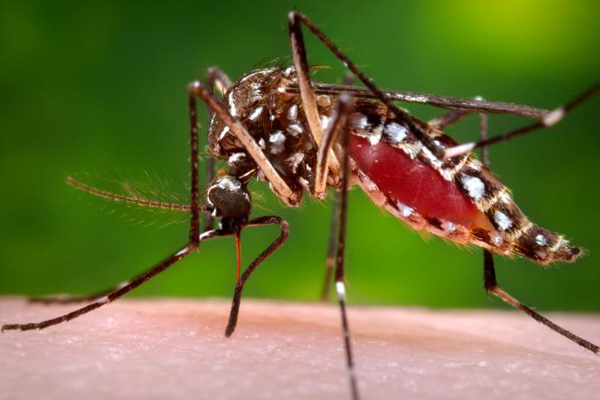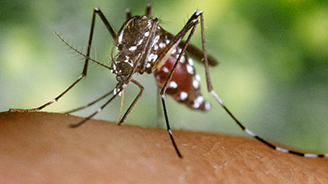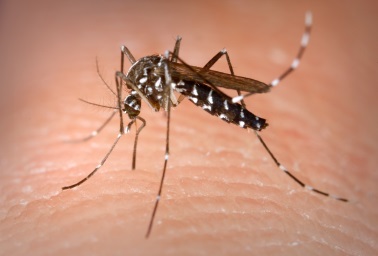by Kate Evans

Mosquitoes can carry the Zika virus, the West Nile virus, malaria, the Chikungunya virus, La Crosse encephalitis, Eastern equine encephalitis, St. Louis encephalitis and dengue fever. The insects lay their eggs in or near standing water.
Mosquito populations are escalating due to summer rains and the warmth around the region. Local residents are urged to protect themselves and their family against mosquito bites and mosquito-borne illnesses by taking several pro-active steps.
Using insect repellent, wearing hats, long pants and long-sleeved shirts outdoors and adopting mosquito control measures around your home can help reduce the annoyance and risks of illness mosquitoes bring.
There are more than 200 kinds of mosquitoes in the United States but only about 12 species carry diseases that can make people sick.
Mosquitoes lay their eggs in and near standing water and can spread diseases such as the Zika virus, the West Nile virus, malaria, the Chikungunya virus, La Crosse (LAC) encephalitis virus, Eastern equine encephalitis virus, St. Louis encephalitis virus and dengue fever.
New mosquito-borne illness
Several new viruses are now associated with mosquito-borne transmission, report Centers for Disease Control and Prevention (CDC) officials. They include the Cache Valley virus, Jamestown Canyon virus and travel-related mosquito-borne illnesses of Japanese encephalitis (Asia and the western Pacific), Rift Valley fever (Africa) and Ross River virus. (Australia and Papua, New Guinea)
Nearly all mosquito-borne viruses carry the risk of meningitis and/or encephalitis.
West Nile, Zika viruses
West Nile virus is the leading cause of mosquito-borne disease in the continental United States, according to the CDC. Virginia and Maryland each reported four West Nile cases in 2021, while West Virginia reported none. Pennsylvania reported 26 West Nile cases with one death.
From 1999-2020 there have been 52,532 West Nile virus cases in the United States, with 707 cases in Pennsylvania, 393 cases in Maryland, 232 cases in Virginia and 24 cases in West Virginia.
Some 38 cases and 15 deaths occurred from Eastern equine encephalitis during 2019 in 10 states. One case was reported each in Pennsylvania, Maryland and Virginia in previous years.
There have been no reports of Zika virus transmission from mosquitoes in the United States since 2018. Infection with the Zika virus during pregnancy can cause birth defects.
Symptoms
Milder symptoms of mosquito-borne illness include fever, headache, body aches, muscle pain, rash, nausea, vomiting, flu-like symptoms and malaise.
Some can develop serious symptoms from mosquito bites such as encephalitis, meningitis, high fever, confusion, severe headache, disorientation, seizures and muscle weakness. Seek medical attention immediately if you develop serious symptoms.

Prevent mosquito bites
Take these precautions to keep yourself, family and pets safe and reduce your risk of mosquito bites and mosquito-borne illness.
Stay indoors at dawn and dusk when mosquitoes are most active.
Wear long-sleeved shirts, long pants and hats when outdoors. Wear mosquito netting over your face and neck when working outside or gardening if possible.
Avoid wearing red and dark colors and using flowery perfumes and scented hair products or aftershave, which attract mosquitoes.
Stay indoors in air-conditioning when possible and sleep in places with air-conditioning and window and door screens to keep mosquitoes outside. Be vigilant about repairing holes in screens.
The best prevention for mosquito bites is wearing insect repellent.
Use Environmental Protection Agency (EPA)-registered insect repellents containing DEET, picaridin, oil of lemon eucalyptus or IR3535 as directed to prevent mosquito bites. Don’t apply repellents to skin under clothing. Apply insect repellents after applying sunscreen and not before.
Treat clothing and gear with permethrin or buy items that are already permethrin-treated.
Children
Center for Disease Control and Prevention (CDC) officials advise that most insect repellents including DEET can be used on children older than two months of age. Oil of lemon eucalyptus should not be used on children under three years old.
Don’t apply insect repellent to a child’s hands, eyes, mouth and cut or irritated skin. Adults should spray insect repellent on their hands and then apply it onto a child’s face.
Mosquito netting can be used to cover children younger than two months old in their cribs, strollers or carriers to protect infants from mosquito bites.
Natural alternatives
Natural alternatives like rosemary, basil, lemon balm and catnip have mosquito-repelling qualities. The essential oil in catnip is very effective for repelling mosquitoes. Crush the leaves and spread their scent on your skin. Eating garlic or using garlic oil may help.
Mosquito-repelling plants
Plant mosquito-deterring flowers and herbs near patios and home entrances. Recommended plants are marigolds, catnip, ageratum, chrysanthemums, citronella, lavender, scented geraniums, basil, rosemary, horsemint, lemon balm, feverfew and pennyroyal.

Mosquito control
Eliminate places where mosquitoes can lay their eggs in standing water. Tightly cover or dump water-holding containers like buckets, bowls, toys, pet dishes, planters, birdbaths, wading pools, vases and trash cans weekly or remove them.
Clean and chlorinate swimming pools and remove standing water from pool covers.
Rid your property of junk items that can collect water such as old tires, refrigerators and washing machines. Eliminate pools of water on boats and tarps. Unclog roof gutters.
Repair and seal your septic system where mosquitoes can breed. Keep grassy areas mowed and cut down weeds near your house.
Clear obstructions in ditches so water can drain properly. Fill in puddles with soil or a mix of sand and gravel.
Spray outdoor mosquito rest areas that include sheds, children’s playhouses, under decks, furniture and playground equipment. Follow safety precautions and the manufacturer’s directions and or hire a pest control professional.
Put up birdhouses for swallows and boxes for bats to encourage these predators to feed on your mosquito population.
Sources: Centers For Disease Control and Prevention, Mayo Clinic, Mother Earth News, the Pennsylvania Department of Health, the Virginia Department of Health, AccuWeather and Garden Design Magazine websites.

